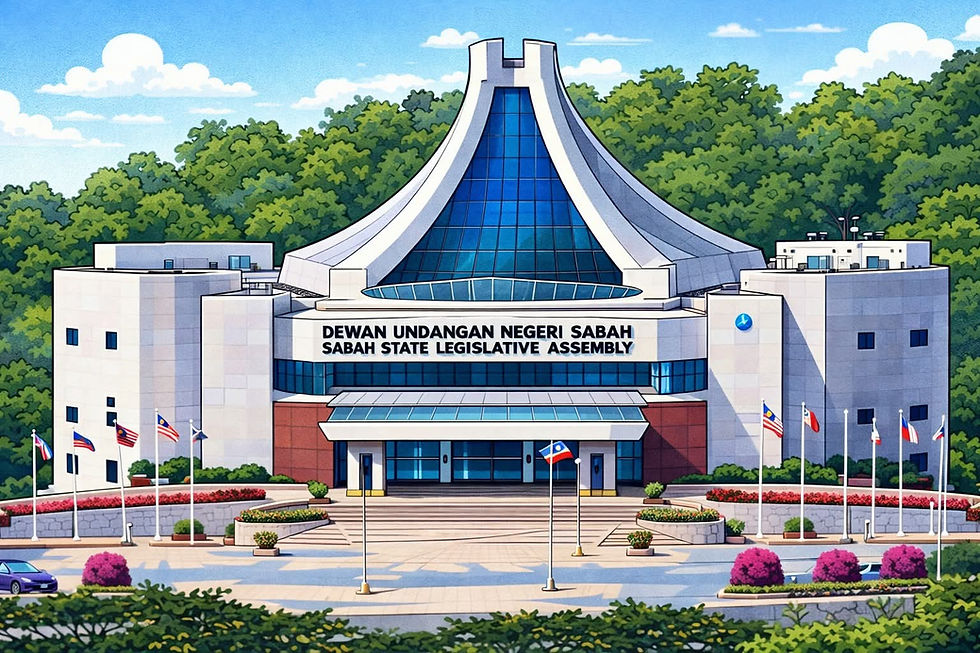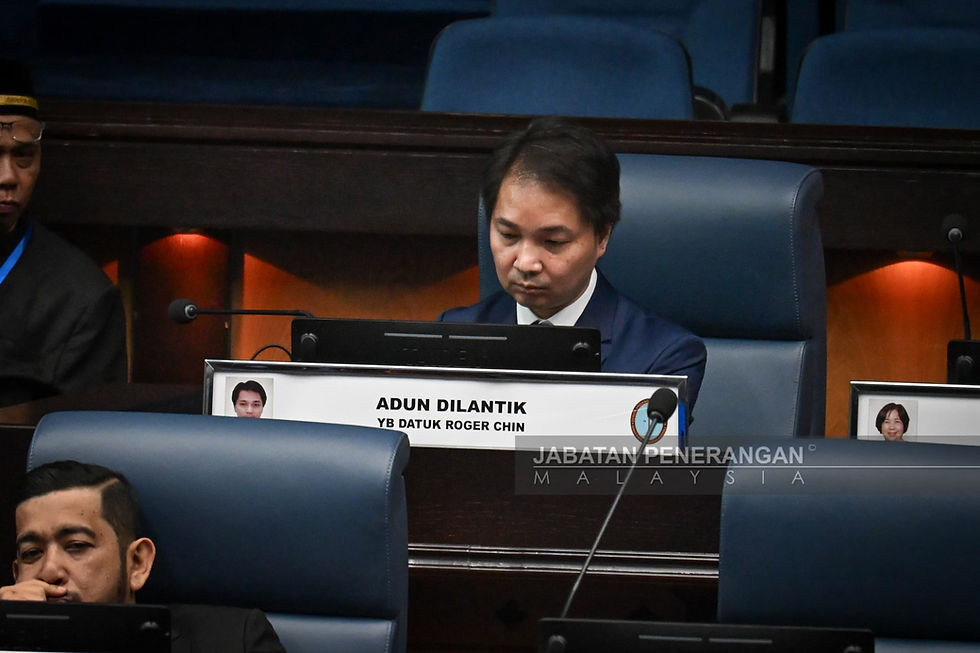UNBANNING THE WORD ‘ALLAH’ IS PARTIALLY RESTORING THE ORIGINAL MALAYSIA
- nabalunews
- Mar 13, 2021
- 6 min read

13 Mar 2021
Malaysians, especially Bornean's, must forge a cross-party consensus to sustain it.
UPKO urges the Federal Government not to appeal against the Kuala Lumpur High Court’s groundbreaking decision on March 10th 2021 (High Court rules use of word Allah by non-Muslims allowed) that declares the 1986 ban by the Federal Cabinet on non-Muslim use of Allah as unlawful and unconstitutional.
The verdict is not an encroachment on the Muslims, as some Malayan political entrepreneurs are attempting to frame it as such. It is a restoration of the pre-1986 status quo, part of the Original Malaysia promised to Sabah and Sarawak in 1963.
All parties should come together to seize the golden opportunity given by the High Court’s decision to close an ugly chapter in the playbook of identity politics in Malaysia. This polemic has hurt for decades so many Bornean and Orang Asli Christians, and their Muslim families and friends who share the pain.
UPKO appeals to all Muslim-led parties, Bersatu, UMNO, PAS, PKR, Amanah, PBB, Warisan and Pejuang to explain to their base that the High Court’s decision is not an encroachment on or threat to Muslims. It is particularly important for Prime Minister Muhyiddin Yassin to show leadership.
Muslim-led parties especially those that have taken a hardline stand would face wild accusations of political entrepreneurs from within their ranks or from the rival camps of being weak and compromised but it is a national service we badly need from them.
UPKO welcomes PAS president Hadi Awang’s reconciliatory statement that there is no prohibition but only limits to non-Muslims in using the term ‘Allah’. (14:50 pm Ada sempadan guna kalimah ALLAH: Presiden Pas)
UPKO urges fellow opposition parties to restrain their own grassroots to use the unbanning of Allah to attack government parties for being soft, even if they were previously subject to such unfair attacks. The Opposition must compete with the Government on issues related to health, economy, education, environment and others, but never one-upmanship in the zero-sum game of ethnicity and religion.
UPKO calls upon all existing 56 MPs from Sabah (including Labuan) and Sarawak and their parties to unite to defend the partial restoration of the Original Malaysia. More than any others, Borneoans must use our political clout to make sure the High Court’s decision is not reversed.
Regardless which side of the divide, Borneo-based parties must be prepared to cut ties, now and even after the next general election, with any parties irresponsibly fanning public discontent against the High Court’s decision. Borneo parties must not accept anti-Borneo Malayans as government partners.
UPKO warns Malaysians against taking likely the consequence of fanatic agitation. In January 2010, churches were set on fire (Fourth church attacked in Malaysia as Allah row deepens), with two men eventually jailed for five years (Church arson: Court upholds jail term of brothers) in one case, and mosques were desecrated (Malaysian fury over pig head insult at mosques) following some Malayan groups’ agitation against the High Court’s first decision in December 31, 2009 to unban Allah in a challenge filed by Catholic newsletter the Herald. (Malaysian court rules Catholic paper can use "Allah").
UPKO urges Sabah’s Chief Minister, Datuk Seri Panglima Haji Hajiji Noor, and the Chief Minister of Sarawak, Datuk Patinggi Abang Johari Abang Openg, to invite the top leaders of all Borneo-based parties to discuss forming a united front to defend the partial restoration of the Original Malaysia if the agitation by some extremist Malayans gains momentum.
Unbanning Allah undoes an encroachment on Borneans and restores the pre-1986 status quo.
The 1986 Federal Cabinet’s decision to ban non-Muslim use of the word Allah and the growing support in Malaya reflects a hegemony-insecurity complex and an under-siege mentality in some Malayans. And innocent Borneans and Orang Asli became the casualties of their arrogance and ignorance.
These Malayans are obsessed with converting others to their faith and develop a paranoia that others are doing the same. They reason that Christians always pray in English, Chinese and Tamil and the use of Malay language in churches must be a conspiracy to convert Malays into Christianity.
These “frogs under coconut shells” (katak di bawah tempurung) project the Malaya they imagine to the rest of world including Sabah and Sarawak, oblivious that Malay is used for centuries in Nusantara by Christians including Bornean natives and Orang Asli and words like Allah have been used by Muslims, Christians and others in Nusantara and Arabia without copyright disputes.
The Allah ban proponents are competing against each other for one-upmanship in Muslim nationalism. They frighten Malayan Muslims that Christians using words like Allah would confuse and convert Muslims, resulting in the demographic, political, economic and social decline of the Muslims.
They mistake Bornean Christians as Zakir Naik whom zealously put down other faiths in his pseudo comparative religion analysis.
Bornean Christians are the antithesis of Zakir Naik. They have siblings, cousins and friends in Islam and other faiths, and they respect each other. Come to Sabah and Sarawak once interstate travel is permitted and see for yourself how interfaith families or clans celebrate each other’s festivals without fearing being converted.
Borneans – be they Muslim, Christian, Buddhist, Taoist, Hindu, Sikh, Animist or Atheist – live to love each other, not to win the number game by zealously confusing, condemning and converting others.
God-loving Borneans understand that if God so wants, He would have made us of one faith. They recognise that we humans are made differently so that we can know and each other. They sincerely believe that it is God’s right, no one else’s, to decide who and when to see the light or guidance (hidayah).
Stop the fear mongering that the restoration of the pre-1986 status quo would see Malay-speaking Christians going on a proselytising spree to convert Muslims. Stop making the victims - Borneo and Orang Asli Christians – the villains in your ugly Malayan game.
Unbanning Allah restores Malaysia’s commonality with 96% of OIC countries
The pre-Islam Arabic word, Allah (the God), has been used by both Muslims and Christians in the Arab world for 1,442 years and in Nusantara for 476 years. The Iban word for God, ‘Allah Taala’, has the same origin.
The Malayan paranoid of cross-faith use of Allah causing confusion is found nowhere in the Muslim world. Christians using Allah in both Arabia and Nusantara have not seen a fall of Muslims in their populations. The Malayan paranoia is not found in Indonesia or Saudi Arabia.
The High Court decision will not make Malaysia less Islamic. Instead, it would restore Malaysia’s commonality with 96% of Organisation of Islamic Cooperation (OIC) countries in allowing Allah to be prayed to in mosques and churches without unease.
Unbanning Allah reaffirms Bahasa Malaysia as a national language
No Allah ban in the Arab and Indonesian languages because they are the national language, not a Muslim-exclusive religious language, for all citizens in the Arab countries and Indonesia. Christians and other non-Muslims don’t have to switch to another language when they pray.
The Allah ban proponents must remember that Malay is a lingua franca, spoken as a common second language by many non-Malays in Nusantara, Borneo natives and Orang Asli, included. While the use of Malay in the Borneo states declined during the colonial time, the trend was successfully reversed with the implementation of the National Language Act 1967, the National Language Policy and the National Education Policy.
In this sense, the 1986 Allah ban was a Muslim Religious Nationalism’s backhanded assault on the Malay Linguistic Nationalism, which aims to Bahasa Malaysia popularly used by all Malaysians including non-Malays and non-Muslims.
The High Court’s decision must also be celebrated as a victory for Bahasa Malaysia. Malay cannot effectively function as Bahasa Malaysia if Muslim and non-Muslim speakers are subject to a ‘vocabulary apartheid’ when they pray to and think about God.
Unbanning Allah reduces politicalization of religion. Malaysians especially Borneoans must stand up for the Original Malaysia.
UPKO prays that Allah will bless all Malaysians who pray to him in Mosques, Churches and Gurdwaras, as well as Buddhists, Taoists, Hindus, Bahais, animists and humanists.
UPKO prays that Allah will bless all with humility to appreciate that our religious, ethnic, cultural and linguistic diversity is His grand plan for us to know, love and care for each other, and not to despise, disrespect and discriminate against each other.
UPKO prays that Allah will bless leaders of all parties with wisdom and courage to embrace the High Court’s decision on March 10 as a key step in restoring and building back better the Original Malaysia. UPKO prays that Allah will bless the existing 56 Members of Parliaments representing from Borneo Malaysia, from PBB (13), Warisan (8), Bersatu Sabah (6), DAP Sarawak (6) DAP Sabah (3), PKR Sabah (2), UMNO Sabah (2), PRS (2), PDP (2), PSB (2), Bersatu Sarawak (2), UPKO (1), PKR Sarawak (1), PBS (1), STAR (1) PBRS (1), SUPP (1) and Independents (2), with a deep love for the Original Malaysia to do what is necessary to reduce politicalisation of religion.
Issued Jointly by:
YB Datuk Seri Panglima Wilfred Madius Tangau
UPKO President, Tuaran P.170 Member of Parliament
YB Senator Datuk Donald Peter Mojuntin
UPKO Deputy President
YB Datuk Ewon Benedick
UPKO Vice President, Kadamaian N.11 Assemblyman
Nelson Anggang
UPKO Secretary General
Felix J Saang
UPKO Youth Chief
Datin Juliana Jani
UPKO Womens’ Movement Chief
Maxolvin Santore
UPKO Young Generation Movement
Tan Sri Wences Anggang
Chairman, UPKO Council of Elders


















Comments